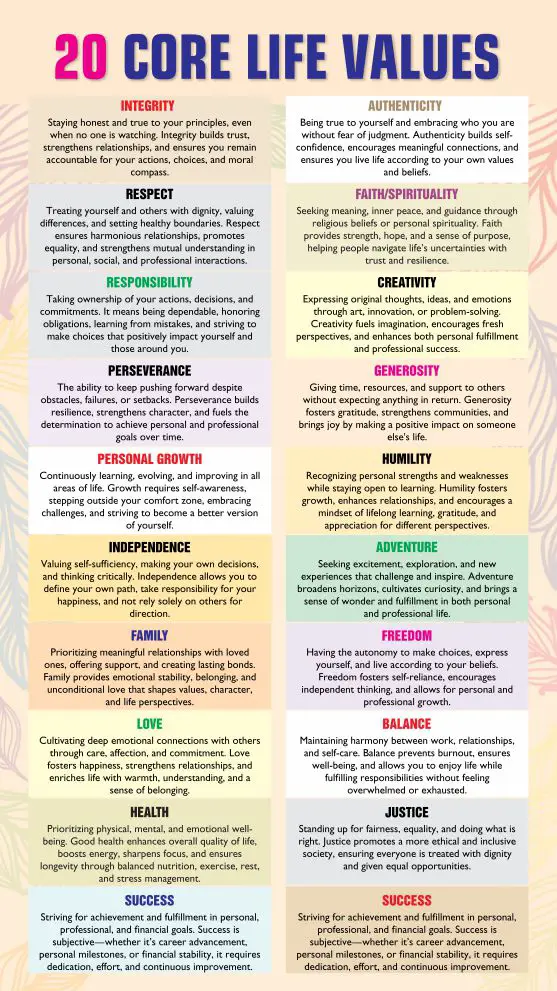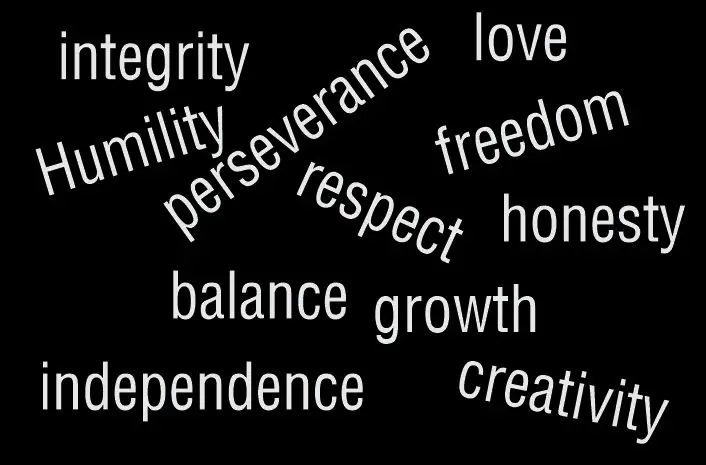Why do some people stay true to their life values while others compromise? Every decision you make, every action you take, and every path you follow is shaped by your values and principles.
Your life is guided by the values and principles you hold, and they also define your purpose. They influence the choices you make, how you relate to others, and the goals you pursue.
By understanding core life values, you can see why some decisions feel right and others feel off.
Principles like integrity, discipline, gratitude, and resilience shape how you respond to challenges and opportunities.
When you act in line with your values, your actions become clearer and more focused.
These guiding beliefs help you in your personal growth journey, build strong relationships, stay grounded in difficult moments, and create a sense of purpose in everyday life.
Taking time to identify and prioritize your values can make your path forward more deliberate, meaningful, and aligned with what matters most to you.
I Thought Life Values Were Universal
I first realized how different people’s life values could be when I left home at 12 for boarding school.
Until then, my world was shaped by my father’s teachings, honesty, integrity, gratitude, and respect.
These weren’t just words in our home; they were the foundation of every action, every conversation, every lesson.
But stepping into a new environment felt like a shock. I saw people lie without hesitation, break promises like they meant nothing, and treat others with blatant disrespect.
Arguments were settled not with reasoning, but with force. Gratitude was rare, and fairness seemed like an afterthought.
At first, I assumed it was just a misunderstanding; maybe they hadn’t been taught the same way I had.
But as days turned into weeks, I realized something unsettling: not everyone valued the same principles I did.
For the first time, I questioned whether the values I held were as universal as I once believed.
Was honesty really important if people got ahead by deception?
Did integrity matter when no one else seemed to care?
The answer came unexpectedly, when a classmate, someone I had seen mock and belittle others, turned to me for help after failing an exam.
I had every reason to ignore him, to return the same indifference I had received.
But my father’s voice echoed in my mind: Do what is right, not what is easy.
So, I taught him. Not because he deserved it, but because I wasn’t willing to compromise my personal values just because others had abandoned theirs.
That experience opened my eyes to a hard truth: life values are a choice.
The world will test them, challenge them, and sometimes make you feel foolish for holding onto them.
But in the end, they define who you are, not just when things are easy, but especially when they are not.

What Are Life Values?
Your life values and principles, beliefs, and guidelines shape how you think, act, and relate to others. Values are what matter most to you: honesty, respect, or responsibility.
According to Mind Tools, life values are central to our identities. They determine what matters to us and what we should give priority.
Principles are the rules you follow to stay true to those values. They guide your choices, from daily decisions to major life changes.
When your actions align with your values, you build trust, self-respect, and a sense of direction. Without them, you may feel lost or conflicted.
Understanding your core values helps you make better decisions, strengthen relationships, and stay grounded in what truly matters.
Related Posts
How Does Integrity Differ from Honesty?
Causes and Consequences of Lack of Integrity
What is Conduct? The Foundation of Your Behaviour
Integrity in Personal Relationships
Why Integrity in Leadership Matters
Integrity in Business: Why You Should Care
Importance of Integrity and Honesty
20 Examples of Core Live Values You Should Prioritize
Core life values shape your decisions, guide behavior, and define who you are.
Prioritizing the right values helps you build meaningful relationships, stay grounded, and lead a purposeful life.
Here are 20 examples to focus on for lasting fulfillment.
Integrity

Integrity is consistently being honest and true to your values, even when no one is watching.
It guides your decisions, ensuring your actions reflect your moral compass.
Living with integrity means taking responsibility for mistakes, honoring commitments, and speaking truthfully.
It builds trust with others, strengthens relationships, and fosters respect in both personal and professional interactions.
When you act with integrity, you align your actions with your principles, creating a life rooted in authenticity, accountability, and consistency.
This foundation allows you to navigate challenges confidently, knowing your choices reflect who you truly are and what you stand for.
Compassion

Compassion is the ability to feel empathy for others and respond with kindness, patience, and understanding.
Another core life value you should express as a human.
It allows you to see the struggles, emotions, and perspectives of those around you without judgment.
Practicing compassion means offering support in difficult times, listening attentively, and acting with generosity and care.
It encourages forgiveness, strengthens relationships, and nurtures a sense of community.
Compassion helps create a more caring and empathetic world where people feel valued and understood.
By prioritizing compassion, you develop deeper connections, cultivate emotional intelligence, and contribute positively to the well-being and happiness of yourself and those you interact with.
Respect
Respect involves treating yourself and others with dignity, valuing differences, and honoring boundaries.
It means listening actively, acknowledging diverse perspectives, and fostering mutual understanding.
Respect strengthens relationships by promoting fairness, equality, and trust in personal, social, and professional settings.
By respecting yourself, you recognize your worth, set healthy boundaries, and avoid harmful influences.
Extending respect to others encourages collaboration, kindness, and a positive environment.
When you prioritize respect, interactions become more meaningful, and conflicts are minimized.
It creates a foundation for strong, lasting connections while ensuring your own needs and the needs of others are acknowledged and valued equally.
Responsibility
Responsibility means owning your actions, decisions, and commitments, rather than blaming circumstances or others.
It requires reliability, accountability, and the willingness to learn from mistakes.
Being responsible involves fulfilling obligations, managing consequences, and striving to make choices that positively impact your life and those around you.
It cultivates self-discipline, trustworthiness, and respect from others.
Responsibility empowers you to take control of your path, pursue goals effectively, and maintain personal integrity.
By embracing this value, you build confidence, demonstrate maturity, and inspire others through consistent actions.
It ensures that your life reflects intentional choices aligned with your principles and long-term well-being.
Perseverance

Perseverance as a core life value is the determination to keep going despite challenges, failures, or setbacks.
It requires patience, resilience, and a mindset focused on long-term goals rather than immediate results.
Practicing perseverance strengthens your character, allowing you to face obstacles with courage and resolve.
It encourages problem-solving, learning from difficulties, and maintaining motivation even when progress feels slow.
By staying committed, you achieve personal growth, develop resilience, and accomplish meaningful objectives.
Perseverance also inspires those around you, showing that consistent effort and determination lead to success.
Embracing this value ensures that setbacks become lessons, failures become stepping stones, and persistence shapes your achievements and personal growth.
Personal Growth

Personal growth is the continuous process of learning, evolving, and improving yourself in all aspects of life.
It involves self-awareness, reflection, and the willingness to step outside comfort zones.
Growth requires embracing challenges, seeking knowledge, and developing skills to better manage relationships, work, and personal well-being.
By prioritizing personal growth, you enhance your confidence, adaptability, and resilience, preparing yourself for new opportunities and experiences.
It encourages meaningful change, emotional maturity, and the pursuit of goals aligned with your values.
Focusing on growth ensures that you remain open-minded, proactive, and committed to becoming the best version of yourself in every area of life.
Independence
Independence is the ability to think, act, and make decisions for yourself without undue reliance on others.
It involves self-sufficiency, critical thinking, and confidence in navigating life’s challenges.
By valuing independence, you take responsibility for your happiness, set personal goals, and pursue your path with clarity.
It encourages accountability, resourcefulness, and the courage to face difficulties without fear of judgment or dependence.
Independence fosters self-reliance while maintaining healthy interdependence with others.
It empowers you to define your priorities, make intentional choices, and create a life aligned with your beliefs.
Living independently allows freedom to shape your destiny intentionally and responsibly.
Family

Family represents the people who provide love, support, and a sense of belonging.
It involves nurturing meaningful relationships, offering guidance, and maintaining strong bonds with those closest to you.
Family teaches values, shapes character, and provides emotional stability during life’s challenges.
Prioritizing family means investing time, care, and attention into these connections, ensuring that they remain strong and enduring.
It is about loyalty, trust, and mutual support, which create a foundation for personal well-being and resilience.
Family bonds influence how you approach relationships, responsibility, and decision-making, providing a source of comfort, identity, and unconditional love throughout life’s journey.
Love

Love is the deep emotional connection you share with others through care, affection, and commitment.
It involves empathy, understanding, and selflessness, allowing you to prioritize the well-being of those you cherish.
Love fosters intimacy, strengthens relationships, and provides a sense of belonging and emotional security.
It inspires acts of kindness, forgiveness, and patience, enriching your personal and social experiences.
Experiencing love encourages personal growth, happiness, and fulfillment while promoting trust and loyalty.
By embracing love in all forms, romantic, familial, or platonic, you create meaningful bonds that enhance life’s richness, support resilience, and bring warmth and joy to both your life and the lives of others.
Health

Health is prioritizing your physical, mental, and emotional well-being.
It involves maintaining a balanced diet, exercising regularly, getting sufficient rest, and managing stress effectively.
Good health strengthens your immunity, sharpens focus, and boosts energy, allowing you to perform daily tasks efficiently and pursue your goals with vitality.
Mental and emotional wellness are equally essential, providing clarity, resilience, and the ability to handle life’s challenges.
By valuing health, you invest in longevity, quality of life, and overall fulfillment.
Taking care of your body and mind ensures that you can enjoy meaningful experiences and contribute positively to your personal and professional life.
Success

Success is the pursuit of achievement and fulfillment across personal, professional, and financial areas.
Its definition varies for each person; it may be reaching career milestones, attaining financial stability, or accomplishing personal goals.
Achieving success requires focus, determination, discipline, and continuous self-improvement.
It is built on hard work, resilience, and strategic decision-making.
Success also involves learning from failures, adapting to challenges, and remaining committed to long-term objectives.
While outcomes differ, the value of success lies in progress, growth, and the satisfaction that comes from striving toward meaningful goals.
Pursuing success encourages ambition while fostering confidence and purpose in life.
Authenticity
Authenticity is embracing your true self without fear of judgment or external pressures.
It involves understanding your values, beliefs, and emotions and expressing them honestly in all areas of life.
Living authentically builds self-confidence, nurtures meaningful relationships, and reduces stress from pretending to be someone you’re not.
Authenticity allows you to make decisions aligned with your principles and ensures that your actions reflect your genuine identity.
By being true to yourself, you create deeper connections with others, foster trust, and experience fulfillment from a life lived honestly.
Authenticity empowers self-expression, encourages self-respect, and supports personal growth and well-being.
Faith/Spirituality

Faith or spirituality is seeking purpose, guidance, and inner peace through personal beliefs, practices, or religion.
It offers strength during challenges, helping you navigate uncertainty with resilience and hope.
Spirituality encourages reflection, mindfulness, and a deeper understanding of life beyond material concerns.
Faith fosters gratitude, compassion, and ethical living, connecting you with something greater than yourself.
It provides comfort, moral grounding, and motivation to act with integrity.
By cultivating faith, you gain clarity, emotional stability, and a sense of meaning that supports personal growth.
Spirituality can enhance well-being, strengthen community bonds, and help you face life’s complexities with trust and resilience.
Creativity
Creativity is expressing original thoughts, ideas, and solutions in innovative ways.
It can manifest through art, problem-solving, writing, invention, or unconventional approaches to everyday challenges.
Practicing creativity encourages imagination, flexibility, and fresh perspectives, helping you overcome obstacles and see opportunities where others might not.
It fosters self-expression, personal fulfillment, and cognitive growth, while also enhancing professional success and adaptability.
Creativity allows you to explore possibilities, challenge norms, and contribute meaningfully to your environment.
Embracing this value inspires innovation, critical thinking, and resourcefulness, making your life more vibrant and your impact on others more significant through originality and thoughtful expression.
Generosity

Generosity is giving your time, resources, or support to others without expecting anything in return.
It involves empathy, compassion, and a willingness to help improve the lives of those around you.
Acts of generosity strengthen relationships, foster community, and create a positive ripple effect of goodwill.
By practicing generosity, you cultivate gratitude, humility, and a sense of purpose.
Giving selflessly can bring joy and fulfillment, reinforcing the idea that meaningful connections and shared well-being matter more than material accumulation.
Generosity reflects the human capacity for kindness, compassion, and collaboration, enhancing both your life and the lives of those you touch.
Humility

Humility is recognizing your strengths and weaknesses while remaining open to learning and growth.
It involves accepting feedback, valuing the contributions of others, and avoiding arrogance.
Humility encourages personal development, emotional intelligence, and stronger relationships.
By staying grounded, you approach challenges with curiosity and resilience rather than pride or fear.
Humble individuals are more approachable, collaborative, and adaptable, which enhances both personal and professional life.
Practicing humility fosters gratitude, perspective, and empathy, creating a mindset focused on improvement rather than comparison.
This value balances confidence with openness, allowing you to grow, connect meaningfully, and contribute positively to the world around you.
Adventure

Adventure is the pursuit of new experiences, challenges, and exploration that expand your perspective.
It encourages curiosity, courage, and a willingness to step outside comfort zones.
Engaging in adventure builds resilience, confidence, and adaptability by pushing you to navigate uncertainty and embrace change.
Adventures can be physical, emotional, or intellectual, broadening horizons and enriching personal growth.
By seeking excitement and discovery, you cultivate creativity, resourcefulness, and a sense of wonder about life.
Adventure fosters memorable experiences, deeper self-awareness, and a mindset that embraces opportunities.
Living adventurously adds meaning and fulfillment, reminding you that life is enriched by curiosity, exploration, and growth.
Freedom

Freedom is having the autonomy to make decisions, express yourself, and live according to your beliefs.
It enables self-reliance, independent thinking, and personal responsibility.
Valuing freedom allows you to define your path, pursue passions, and align your actions with your values.
It encourages creativity, critical thinking, and the courage to stand up for your principles.
Freedom also encourages accountability, as it requires making choices thoughtfully and accepting the consequences.
When you embrace this value, you can achieve personal growth, explore new opportunities, and maintain mental and emotional independence.
Freedom empowers you to live intentionally and shape your life purposefully.
Balance

Balance is maintaining harmony between work, relationships, and personal well-being.
This life value ensures that no aspect of life is neglected while preventing burnout and stress.
Practicing balance involves prioritizing responsibilities, managing time effectively, and allocating space for self-care, relaxation, and personal growth.
It encourages mindful decision-making, emotional stability, and long-term fulfillment.
Balance supports sustainable productivity, strong relationships, and mental clarity, allowing you to enjoy life fully without feeling overwhelmed.
By cultivating this value, you foster resilience, adaptability, and overall well-being.
Balance creates a life that is steady, rewarding, and aligned with your goals, needs, and values.
Justice

Justice is the commitment to fairness, equality, and ethical behavior in your actions and decisions.
It involves standing up for the rights of others, promoting inclusion, and ensuring that people are treated with dignity.
Practicing justice requires integrity, empathy, and courage to address inequalities and support those who are vulnerable.
It fosters trust, respect, and ethical behavior in communities, workplaces, and personal relationships.
By valuing justice, you contribute to a society where accountability, equality, and fairness are prioritized.
Embracing this value enables you to advocate for positive change, uphold moral principles, and foster a more balanced, equitable, and ethical environment for everyone.
Identifying Your Personal Values
Knowing your values helps you make better decisions, stay true to yourself, and build a life that feels meaningful.
But how do you figure out what truly matters to you?
Start with Reflection
Think about the experiences that shaped you. What moments made you feel proud, fulfilled, or at peace?
What situations made you uncomfortable or conflicted? Answering these questions can help you recognize the values that influence your choices.
Use Journaling to Find Patterns
Writing down your thoughts helps uncover recurring themes in your life.
Set aside time each week to reflect on moments that stood out, positive or negative.
Over time, you’ll notice patterns that reveal what you truly value.
Practice Mindfulness
Quieting your mind helps you connect with your inner beliefs. Try mindfulness meditation or visualization exercises.
Picture yourself living a life that feels right. What values are at the core of that vision?
You might want to take the personal value assessment here.
Rank Your Values
Create a list of values, honesty, respect, freedom, responsibility, or anything that resonates with you.
Rank them from most to least important. This simple exercise helps you see what matters most and how to align your life with those priorities.
Take Action
Once you identify your core values, use them as a guide for daily decisions. Ask yourself: Does this choice reflect my values?
Over time, this practice strengthens your commitment to living with purpose and integrity.
The Role of Life Values in Decision-Making
Your values shape every choice you make, from the smallest daily habits and decisions to the biggest life-changing moments.
When you’re clear on what matters most, decision-making becomes more intentional and less stressful.
Filtering Choices Through Core Values
Think of your values as a guide. They help you weigh options and stay aligned with what truly matters to you.
If family is a top priority, you might turn down a job that requires constant travel.
If honesty is a core value, you’ll speak the truth even when it’s uncomfortable.
Real-Life Impact of Values
Imagine being offered a promotion that requires moving to a new city.
If family is your top value, you may choose to stay close to loved ones rather than chase career growth.
If ambition drives you, you might leap. Your values dictate the path you take.
Integrity in Daily Decisions
Living by your values means making consistent choices, even when it’s hard. If honesty is non-negotiable, you won’t cover up mistakes at work.
If generosity matters, you’ll give without expecting something in return. These small decisions shape your character and influence how others see you.
Making Life Choices with Confidence
When you define and prioritize your values, your choices feel more meaningful.
Instead of reacting to situations, you take control, ensuring every step aligns with the life you want to build.
Recommended: Find Out How Much Influence Your Emotions Have Over You
Aligning Your Life with Your Values
When your daily choices align with what truly matters to you, life feels more meaningful.
But without conscious effort, it’s easy to drift away from your core beliefs. Here’s how to stay true to them.
Here is how to go about it:
Identify What Truly Matters
Start by reflecting on what’s important to you. What do you stand for? What principles guide your decisions?
Writing down moments when you felt the most fulfilled can reveal recurring themes.
Once you have a clear list, rank them by priority. This helps you focus on values that drive your decisions, not just ideals you admire.
Set Goals That Reflect Your Values
Your life goals should align with your core beliefs. If honesty is a priority, choose relationships and career paths that allow you to be transparent.
If personal growth matters, commit to learning new skills or expanding your perspective.
Break these goals into daily actions, small steps that reinforce the life you want to build.
Check in with Yourself Regularly
It’s easy to get caught up in routine and lose sight of your values. Take time to reflect, are your actions matching your beliefs? If not, make adjustments.
Practices like journaling or mindfulness can help you stay aware of whether you’re living in alignment with your principles.
Build an Environment That Supports Your Values
Surround yourself with people, habits, and experiences that reinforce what matters most to you.
If kindness is a priority, engage in acts of service. If discipline is key, create a structure that keeps you accountable.
The more your environment reflects your values, the easier it is to live by them.
The Impact of Values on Relationships
According to Calm, values in relationships are the basic beliefs and principles that determine how people treat each other in relationships.
Whether in friendships, romantic relationships, or professional partnerships, shared principles create stronger bonds, while conflicting values can lead to tension.
Understanding how values influence relationships helps you build connections that are meaningful and lasting.
Here are how your values can impact your relationships:
Shared Values Strengthen Trust and Understanding
When you and another person hold similar beliefs about honesty, respect, or responsibility, communication flows more easily.
You don’t have to explain or justify every decision because there’s an unspoken understanding of what matters to both of you.
This trust allows you to navigate challenges together without constant conflict.
How Conflicting Values Create Tension
Differences in values don’t always mean a relationship is doomed, but they can create friction.
If you value financial responsibility and your partner prefers impulsive spending, disagreements will arise.
If hard work drives you but your colleague avoids responsibility, teamwork becomes frustrating.
These differences can be managed through honest conversations, but when core values clash, compromise may not always be possible.
Communicating About Values
Instead of assuming others share your perspective, discuss what matters to you early in any relationship.
If conflicts arise, focus on understanding the other person’s point of view rather than trying to change them.
Respecting differences, even when you don’t agree, helps maintain mutual respect.
Aligning Relationships with Your Values
Surround yourself with people who support your principles. If kindness is important to you, build friendships with those who treat others with compassion.
If integrity is a priority, work with colleagues who value honesty. The more your relationships reflect your values, the more fulfilling they become.
Life Values in Career Choice
Your career isn’t just about earning a paycheck; it’s about finding work that aligns with what matters to you for the longest time. As Career Research puts it, “career satisfaction is not job satisfaction.”
Job satisfaction is a person’s satisfaction with a single job, while career satisfaction is the average satisfaction across jobs.
When your job reflects your values, you feel more motivated, engaged, and fulfilled.
Ignoring this connection can lead to frustration and burnout, making even high-paying jobs feel empty.
Here is how to go about it:
Defining What Matters to You
Before choosing a career, take time to identify your core values. Do you prioritize creativity, flexibility, leadership, or making a difference in your community?
Are work-life balance and personal growth important? Knowing what drives you helps you find a path that fits your long-term goals.
Aligning Your Career with Your Values
Once you understand your values, look for careers that reflect them. If you value innovation, a dynamic industry like tech or design might be a good fit.
If helping others is important, healthcare, education, or social work could be fulfilling.
Research companies to see if their culture aligns with your principles.
A company that shares your ethics and beliefs will feel like a better place to grow.
Making Informed Career Choices
Talk to professionals in fields that interest you. Ask how their values shape their work experience.
Look into job roles, industries, and work environments that match what you care about.
If your current job doesn’t align with your values, consider ways to shift toward work that does, whether by changing roles, industries, or even starting your own venture.
Long-Term Career Satisfaction
A career built on your values keeps you engaged and resilient. When challenges arise, you’ll have a stronger sense of purpose to push through. Your work will feel meaningful, not just like a daily obligation.
Overcoming Challenges to Maintain Your Values
Living by your values isn’t always easy. You’ll face pressures from friends, society, and even your own doubts.
Staying true to what matters requires awareness, confidence, and a plan to handle these challenges.
Dealing with Peer Pressure
People around you may expect you to think or act a certain way, even if it goes against your beliefs.
It’s easy to give in when you want to fit in, but staying firm in your values means knowing yourself well.
Take time to reflect on what truly matters. Surround yourself with people who respect your principles and encourage you to stick to them.
Breaking Free from Societal Expectations
Society often defines success by status, wealth, or recognition. But if those measures don’t align with your values, chasing them will leave you unfulfilled.
Define success on your own terms. Whether you prioritize family, creativity, purpose, or balance, honor what feels right for you rather than what others expect.
Overcoming Self-Doubt
Doubt creeps in when your values are tested. You might question your choices or wonder if standing firm is worth it.
To stay grounded, write down your core values and review them when you feel uncertain.
Seek advice from mentors or like-minded people who can reinforce your perspective.
Staying Committed to Your Principles
Challenges will come, but every time you choose your values over external pressures, you strengthen your integrity.
When you live in alignment with what you believe, you build confidence and a sense of purpose that no outside force can shake.
Reassessing Your Values Over Time
Your values shape your decisions, relationships, and sense of purpose. But as life changes, so do your priorities.
What mattered to you five or ten years ago may not hold the same weight today.
Taking time to reflect on your values helps you stay aligned with who you are becoming.
How Life Stages Influence Your Values
Different phases of life bring new experiences that can shift your perspective.
In your twenties, you might focus on career growth and financial stability.
By your thirties or forties, you may prioritize work-life balance or personal relationships.
As you enter retirement, fulfillment and legacy might take center stage.
Recognizing these shifts allows you to adjust without feeling stuck in outdated beliefs.
The Impact of Life-Changing Events
Major life events:
- losing a loved one,
- becoming a parent,
- changing careers
…can challenge your existing values. These moments force you to reassess what truly matters.
Instead of resisting change, ask yourself: Does this still align with who I am?
Adapting your values to reflect your growth can bring clarity and direction.
How to Check in With Your Values
Set aside time to reflect. Journaling, meditation, or deep conversations can help you evaluate whether your current values still serve you.
Look back at past decisions, do they still make sense? Are you living in a way that feels right? If not, it may be time to redefine what’s important.
Embracing Change While Staying True to Yourself
Reassessing your values doesn’t mean abandoning them. It’s about making sure they reflect the person you are today.
Being open to growth while staying grounded in your core beliefs helps you move forward with confidence and purpose.
Sharing Your Values with Others
Your values shape how you interact with the world, and sharing them helps build trust and understanding.
Whether with family, friends, or colleagues, expressing what matters to you can strengthen connections and create a more supportive environment.
Communicate with Clarity and Respect
How you share your values affects how they are received. Instead of imposing your beliefs, focus on open and respectful communication.
Use “I” statements to express your thoughts without sounding confrontational.
For example, saying “I value honesty and appreciate open conversations” invites discussion, while “You never tell the truth” may create defensiveness.
Start Meaningful Conversations
Talking about values doesn’t have to be formal. A simple question like “What’s something you value in friendships?” or “What guides your decisions in tough situations?” can spark insightful discussions.
Showing interest in others’ perspectives makes them more likely to engage with yours.
Create Spaces for Open Dialogue
Whether at family dinners, team meetings, or casual gatherings, setting aside time for discussions about values can build mutual respect.
When conflicts arise, referring back to shared values can help find common ground.
Live Your Values Every Day
Actions speak louder than words. When people see you staying true to your principles, they are more likely to understand and respect them.
Leading by example can be more powerful than any conversation.
Frequently Asked Questions
Why are values important in decision-making?
Values serve as a moral compass, guiding choices to ensure they align with what truly matters.
How can I identify my core values?
Reflect on meaningful experiences, journal thoughts, and observe recurring themes in decisions and feelings.
What happens when personal values conflict with societal expectations?
You may feel pressured, but defining success on your terms supports fulfillment over external validation.
Can values change over time?
Yes, life experiences and growth can shift priorities, requiring regular reflection and realignment.
Conclusion
Living by your life values and principles provides a foundation for authenticity, fulfillment, and resilience.
When your actions reflect your principles, decision-making becomes clearer, relationships strengthen, and career choices feel meaningful.
However, maintaining integrity requires self-awareness, the courage to resist external pressures and adaptability to personal growth.
Regular reflection ensures alignment, helping you navigate challenges with confidence.
In a world where compromise is common, staying true to your values is a powerful act of self-respect and purpose.
By consciously defining and living your values, you shape a life that truly resonates with who you are.
Pious Clements is the insightful voice behind "The Conducts of Life" blog, where he writes about life ethics, self-development, life mastery, and the dynamics of people and society.
With a profound understanding of human behaviuor and societal dynamics, Pious offers thought-provoking perspectives on ethical living and personal growth.
Through engaging narratives and astute observations, he inspires readers to navigate life's complexities with wisdom and integrity, encouraging a deeper understanding of the human experience and our place within society.
